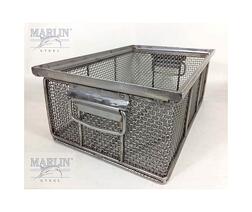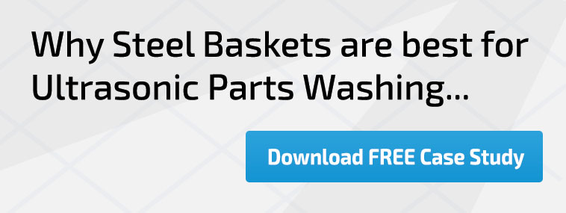 Here at Marlin Steel, our degreed engineers get a lot of questions about custom metal baskets from customers. Today, we wanted to address some of the most frequently asked questions our degreed mechanical engineers are called on to answer for customers.
Here at Marlin Steel, our degreed engineers get a lot of questions about custom metal baskets from customers. Today, we wanted to address some of the most frequently asked questions our degreed mechanical engineers are called on to answer for customers.
So, without further ado, here are some of the most frequently asked questions customers have for Marlin Steel’s degreed engineers:
FAQ #1: What Kind of Material Should I Use for My Basket?
This particular question, while the most common, is also one that doesn’t really have a single perfect answer. The core material that you should use for your basket depends on a number of factors, including:
-
The Use of Your Basket. Are you using your basket for materials handing or parts washing/finishing? The use of your basket will affect your choice of materials, as different applications will have different performance requirements to ensure maximum efficacy.
-
Budget. Some materials cost more than others do. While investing in the best materials for your baskets up front can often save money in the long run, the expense of such materials can occasionally be prohibitive. We typically recommend using the most cost-effective materials that meet all of your basic performance needs for tensile strength, temperature tolerance, and chemical resistance.
-
Storage Conditions. Where are your baskets going to be placed when not in use? What are the air conditions of the location(s) where you’re going to be using the baskets? While the processes that you will be using the baskets for are an important consideration, the storage conditions of your baskets can be just as important. For example, if your factory is in a coastal area with lots of salt in the air, your baskets will need to be highly corrosion resistant, or else the salty air will cause the baskets to corrode prematurely.
Depending on the use of your basket, your budget, and even the environmental factors of your location, your choice of materials for your basket will change.
One of the most popular choices for materials handling/parts washing baskets is the use of grade 304 stainless steel. This particular material strikes an effective balance of corrosion resistance, temperature tolerance, and cost effectiveness for most clients. However, before settling on any material for your basket, our degreed engineers recommend consulting with a professional to see which materials would be right for your particular situation.
FAQ #2: Should I Use a Coating for My Basket?
This is another question where the answer is heavily influenced by your use for your basket, your budget, and the storage conditions of your baskets. For many general uses, simply picking the right material for the metal of the basket is enough. However, for some applications, using an extra coating can vastly improve the utility of a basket.
For some applications where parts cannot be allowed to become scratched, using a soft coating such as thick PVC or other soft plastics can prevent parts from becoming damaged by the sides of the basket meant to hold the part and keep it safe. At other times, adding a hard non-stick coat of material can be useful for keeping chemicals from your parts washing/finishing process from sticking to the baskets.
As with the choice of material for your basket, it is often best to consult with an engineering expert to determine whether or not you need a specialized coating for your baskets, and which coating to use for a given job.
FAQ #3: How Should I Clean My Baskets?
While many stainless steel alloys are corrosion resistant, they still need a certain amount of basic care in between uses to ensure that their longevity is maximized and that they retain their stainless appearance. While many routine uses of stainless steel products involve cleaning or sterilization during regular operation, washing baskets in between uses can be very helpful.
Some cleaning methods include using specially-formulated caustic soda, organic solvents, or even acidic solutions. Certain acidic solutions contain oxalic acid, which is particularly effective at removing rust stains from metals. However, be careful to avoid using a strong reducing acid such as hydrofluoric or hydrochloric acid, as these powerful acids can be harmful to even the most corrosion resistant alloys.
One example of a commercial cleaner that is good for use on most steel alloys would be Bon Ami.
 FAQ #4: Should I Use Perforated Sheet Metal or Wire Mesh for My Basket?
FAQ #4: Should I Use Perforated Sheet Metal or Wire Mesh for My Basket?
This is another common question that customers looking to change their current basket designs often ask. Here, the use of your basket is the primary determining factor in your choice of perforated sheet metal or wire mesh.
Wire mesh allows you to more easily control the amount of open space in your basket design, and is generally ideal for parts washing and finishing applications, as the rounded surface of the wires prevents chemicals, metal shavings, and other byproducts of such processes from settling inside the basket.
On the other hand, perforated sheet metal generally tends to have a higher tensile strength than wire mesh, and handholds can be easily cut into the sides of the basket. This makes perforated sheet metal a solid choice for parts/materials handling uses, as they can take more weight without becoming deformed.
Consult with a Degreed Mechanical Engineer
Going into a detailed list of every possible design necessity for every conceivable basket design and parts washing, materials handling, or finishing process would take a publication of encyclopedic length. However, you can easily leverage the expertise of a professional team of degreed engineers simply by contacting Marlin Steel for more information today.
Over 20% of Marlin Steel’s staff are degreed mechanical engineers who have the knowledge and experience necessary to answer a variety of questions about your basket design needs. Combined with the used of advanced computer modeling and virtual stress-testing, they can make sure that your basket design will meet all of your needs for performance and longevity, as well as make suggestions for how you can improve your basket design if necessary.


 FAQ #4: Should I Use Perforated Sheet Metal or Wire Mesh for My Basket?
FAQ #4: Should I Use Perforated Sheet Metal or Wire Mesh for My Basket?
.gif)


